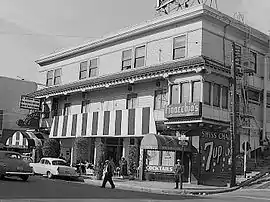Finocchio's Club
Finocchio's was a nightclub and bar in San Francisco. The history of the club started as a speakeasy called the 201 Club in 1929, located at 406 Stockton Street.[1] In 1933, with the repeal of prohibition, the club moved upstairs and started to offer female impersonation acts; after police raids in 1936 the club relocated to the larger 506 Broadway location.[1][2] Finocchio's night club opened June 15, 1936 and was located in San Francisco, California, above Enrico's Cafe at 506 Broadway Street in North Beach. The term "Finocchio" is Italian for fennel but is often a negative term for homosexual.[1]

History
Joseph "Joe" Finocchio, the creator of the club,[3] had the idea of a nightclub with female impersonators in costumes when a patron jokingly went on the stage of his club and did a routine that the crowd enjoyed. The club was not advertised as a gay club; it was advertised as a place for entertainment and fun. Both gay and straight performers worked there. The acts included varying ethnic-inspired performances such as geisha-style performances, which may have helped encourage tourists and contributed to the diverse, often racially diverse crowds, which was unusual during this time of segregation.[1][2] In the days before gay liberation, female impersonator clubs provided semi-public social spaces for sexual minorities to congregate.[2]
Finocchio's often featured traditional drag, with performers in gowns singing or lip-synching to top 40 ballads.[4]
Finocchio's was "off limits" during World War II, not due to the entertainment, but rather for selling liquor to the military outside the authorized hours of sales. On December 31, 1943 the ban was lifted after Joe Finocchio and other bar owners signed an agreement to limit liquor sales to military personnel between 5 pm and midnight.[5]
Finocchio's was a huge favorite with tourists from the 1930s to the early 1990s. Joe Finocchio died in January 1986.[6] Eve Finocchio, Joe's widow, decided to close the club on November 27, 1999 because of a significant increase in the monthly rent and dwindling audience attendance.[5]
Influence
A 14-page program, "Finocchio's: America's Most Unusual Nightclub", was published by Zevin-Present, circa 1947. The Finocchio shows published playbills.
Celebrities who attended shows at Finocchio’s throughout their many years of operation included Judy Garland, Marilyn Monroe, Bette Davis, Lena Horne, Joan Crawford, Barbra Streisand, Mae West, Carol Channing, William Haines, Elizabeth Taylor, Montgomery Clift, Roddy McDowall, Liza Minnelli, Cher and Bette Midler among others.
After the closure, another San Francisco establishment called Harry Denton's Starlight Room started a drag show in 2006 called "Sunday's a Drag," a female impersonation show modeled after Finocchio's.[4] These shows are hosted by Donna Sachet.[4]
Notable acts
Artists who performed at Finocchio's included (in alphabetical order):
- David de Alba, often dressed as Judy Garland or Liza Minnelli.[7][8]
- Vaughn Auldon
- Jim Bailey, performed at Finocchio's in the 1970s.
- Kenny Bee (aka. Kenneth Bachelor)[9]
- Bobby Belle
- Francis Blair[9]
- Ray Bourbon[10]
- Aleshia Brevard, her Marilyn Monroe impression became well enough known that Marilyn Monroe came to see her perform.[11]
- Lenny Bruce, comedian[12]
- LaVern Cummings[7][13]
- Francis David
- Val DeVere
- Frank Doran
- Ray Francis
- Nicki Gallucci
- Candi Guerrero[14]
- Tex Hendrix[15]
- Sir Lady Java
- Bobby Johnson
- Pussy Katt[1]
- Brian Keith[16]
- Bambi Lake
- Milton La Maire
- Lestra La Mont
- Jeri-Lane
- Paul La Ray
- Harvey Lee (aka. Harvey Wilson Goodwin)[17]
- Del LeRoy
- Li-Kar, performed a "Geisha dance" and was also a designer and artist, contributing visuals to the Finocchio's playbill.[18]
- John Lonas
- Johnny Mangum
- Katherine Marlow
- Jackie Maye
- Kelly Michaels, as Madonna in the late 1980s.[19]
- Mike Michelle
- Karyl Norman, worked at Finocchino's circa the 1930s, a former well-known vaudeville performer.[20]
- Lucian Phelps ("a Sophie Tucker expert", or "Male Sophie Tucker") would wear Sophie Tucker's actual gowns and early in their career performed vaudeville.[21][9]
- Jackie Philips
- Charles Pierce[22]
- Russell Reed
- Libby Reynolds
- Craig Russell
- Lori Shannon[23]
- Francis Stillman
- William Stoffler
- Holotta Tymes[24]
- Carroll Wallace[7]
- Holly White
See also
- Black Cat Bar – a former queer bar in San Francisco (open 1906–1921, re-opened 1933–1964).
References
- "'Finocchio's – a nightclub' on A Gender Variance Who's Who, Essays on trans, intersex, cis and other persons and topics from a trans perspective.......All human life is here, blog by Zagria". Retrieved Sep 15, 2013.
- "'Finocchio's, a Short Retrospective a Historical Essay' on Digital Archives @ FoundSF by Susan Stryker". Retrieved Sep 15, 2013.
- Summers, Claude (2012). The Queer Encyclopedia of Music, Dance, and Musical Theater. Cleis Press Start. p. 40. ISBN 9781573448758.
- Zinko, Carolyne (June 29, 2008). "Sunday's a Drag". SFGate. Hearst Communications, Inc. Retrieved September 19, 2014.
- Hamlin, Jesse (November 4, 1999). "What a Drag: Finocchio's to Close, Cross-dressers have entertained at club for 63 years from SFGate.com". The San Francisco Chronicle.
- "Joseph Finocchio Dies; S.F. Transvestite Show from LA Times". Los Angeles Times. January 16, 1986.
- "TransVocalizers, David de Alba, Part II". Transgender Forum. Retrieved 2015-11-23.
- Webb, Dewey (1994-03-30). "Converting to Judyism Lions And Tigers And Garland Impersonators! Oh, My!!". Phoenix New Times. Retrieved 2020-01-07.
- "Don Paulson and Skippy LaRue photograph collection, 1903-2000". Archives West Orbis Cascade. University of Washington Libraries. Retrieved 2020-01-07.
- "Ray's Story, Nightclubs and Broadway". Don't Call Me Madam, the Life and Work of Ray Bourbon. Retrieved 2015-11-23.
- Brevard, Aleshia (2013). The Woman I Was Not Born To Be. Temple University Press. ISBN 1566398401.
- Gates III, William H. (1999-11-08). "What a Drag". The Journal Record.
- Gremore, Graham (2014-07-14). "PHOTOS: Step Back in Time with the Fabulous Drag Queens of Yesteryear". Queerty. Retrieved 2020-01-07.
- "Transgender elder looks back on her life". The Bay Area Reporter / B.A.R. Inc. 2016-11-30. Retrieved 2020-01-07.
- "Mr. Tex Hendrix at Finocchio's (1942)". The Virtual Museum of The City of San Francisco. Retrieved 2015-11-23.
- "David de Alba Interviews FI Brian Keith". Transgender Forum. 2014-11-24. Retrieved 2015-11-23.
- "Harvey Goodwin Collection, 1913-1992". University of Arkansas at Little Rock, Center for Arkansas History and Culture. Retrieved 2020-01-06.
- Brosnan, Kathleen A.; Scott, Amy L. (2013). City Dreams, Country Schemes: Community and Identity in the American West. University of Nevada Pres. ISBN 9780874178647.
- "The Divas Diaries - February 7, 2018". SF Weekly. 2018-02-07. Retrieved 2018-12-13.
- Cullen, Frank; Hackman, Florence; McNeilly, Donald (2007). Vaudeville old & new: an encyclopedia of variety performances in America. Psychology Press. p. 833. ISBN 9780415938532.
- Summers, Claude (2012). The Queer Encyclopedia of Music, Dance, and Musical Theater. Cleis Press Start. p. 40. ISBN 9781573448758.
- Hamlin, Jesse; Writer, Chronicle Staff (1999-11-04). "What a Drag: Finocchio's to Close / Cross-dressers have entertained at club for 63 years". SFGate. Retrieved 2020-01-07.
- Miller, Johnny; Librarian, Chronicle (2009-02-08). "Drag queen Don McLean dies". SFGate. Retrieved 2018-12-13.
- "I AM YOUR QUEEN: Holotta Tymes". SF Weekly. Retrieved 2015-11-23.
External links
- Video from Finocchio's Club (November 24, 1943) featuring Michael Callahan and Forgotten Day
- Video featuring Finocchio's Club and an interview with LaVerne Cummings from the television show "On The Town" (circa 1980) with Connie Chung
- Various Finocchio's publications in the Digital Transgender Achieve
